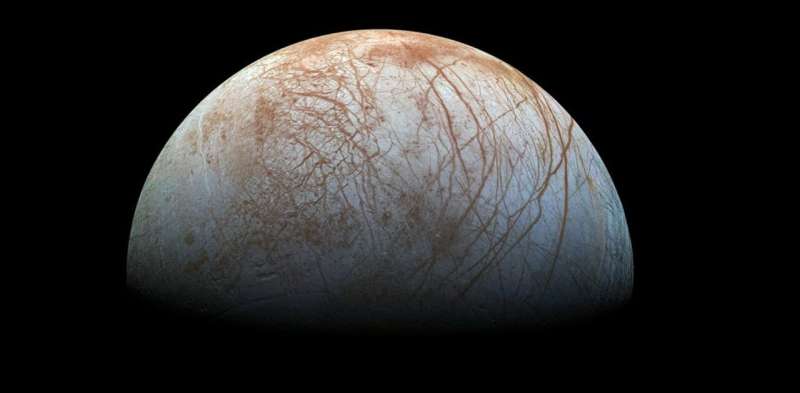
Copernical Team
Video: The Fingertip Galaxy: Reflecting Euclid in art

"After Euclid's lifetime, it will just be floating in space. What if future beings found Euclid? How would they know anything about the humanity of the people?" says Tom Kitching, lead scientist of Euclid's VIS instrument.
The team behind ESA's Euclid mission has come together to create something special—a personal and collective galaxy-shaped fingerprint painting that has been attached to the spacecraft ready to launch into space. The collaborative nature of the artwork reflects the collaborative nature of the Euclid project overall; in both cases, people have come together to build something unique.
The Fingertip Galaxy was created by visual artist Lisa Pettibone and Euclid instrument scientist Tom Kitching. Since the very first fingerprint was pressed down in 2019, over 250 scientists and engineers have contributed to the piece of art.
So why a galaxy? Euclid is a galaxy-imaging machine that will observe billions of galaxies out to 10 billion light-years to make a 3D map of the Universe. The mission's ultimate aim is to explore dark matter and dark energy.
"Although Euclid has always been beautiful in concept and materials, it didn't really say anything about the people involved and humanity as a whole.
NASA considers sending swimming robots to habitable 'ocean worlds' of the solar system

NASA has recently announced US$600,000 (£495,000) in funding for a study into the feasibility of sending swarms of miniature swimming robots (known as independent micro-swimmers) to explore oceans beneath the icy shells of our Solar System's many "ocean worlds". But don't imagine metal humanoids swimming frog-like underwater. They will probably be simple, triangular wedges.
Pluto is one example of a likely ocean world. But the worlds with oceans nearest to the surface, making them the most accessible, are Europa, a moon of Jupiter, and Enceladus, a moon of Saturn.
Life inside ocean worlds
These oceans are of interest to scientists not just because they contain so much liquid water (Europa's ocean probably has about twice as much water as the whole of Earth's oceans), but because chemical interactions between rock and the ocean water could support life. In fact, the environment in these oceans may be very similar to that on Earth at the time life began.
Terrae Novae: Earth orbit, Moon and Mars
 Video:
00:02:18
Video:
00:02:18
Terrae Novae is ESA’s exploration programme.
Terrae Novae is not only literally about exploring new worlds, but by describing the limitless opportunities for discovery, economic growth and inspiration it also expresses our ambitions for Europe’s future innovators, scientists and explorers.
This video shows the many exploration activities ESA is conducting or has planned in our Solar System, from the International Space Station to the Moon with the European Service Module and lunar Gateway modules for Artemis, and on to Mars with the Mars Sample Return campaign.
For more on ESA’s human and robotic exploration strategy see: https://www.esa.int/terraenovae
Virgin Orbit launches 'Straight Up' mission for US Space Force
 Virgin Orbit (Nasdaq: VORB) has confirmed the success of its fourth consecutive satellite launch mission. This launch, named Straight Up, carried seven satellites to Low Earth Orbit for the United States Space Force (USSF), who procured this launch for the Rocket Systems Launch Program, with payloads provided by the Department of Defense Space Test Program (STP). In support of its mission partne
Virgin Orbit (Nasdaq: VORB) has confirmed the success of its fourth consecutive satellite launch mission. This launch, named Straight Up, carried seven satellites to Low Earth Orbit for the United States Space Force (USSF), who procured this launch for the Rocket Systems Launch Program, with payloads provided by the Department of Defense Space Test Program (STP). In support of its mission partne NTU Singapore successfully launches its 10th satellite into space
 Singapore's latest satellite, designed and built by students from Nanyang Technological University, Singapore (NTU Singapore), is now successfully orbiting around Earth, having launched yesterday (30 Jun 2022) on an Indian Space Research Organisation Polar Satellite Launch Vehicle.
The latest NTU satellite, named SCOOB-I, is the first of the new Student Satellite Series (S3-I) to be launch
Singapore's latest satellite, designed and built by students from Nanyang Technological University, Singapore (NTU Singapore), is now successfully orbiting around Earth, having launched yesterday (30 Jun 2022) on an Indian Space Research Organisation Polar Satellite Launch Vehicle.
The latest NTU satellite, named SCOOB-I, is the first of the new Student Satellite Series (S3-I) to be launch Terran Orbital completes NASA Pathfinder TD 3 bus commissioning
 Terran Orbital Corporation (NYSE: LLAP) reports that its Pathfinder Technology Demonstrator 3 (PTD-3) satellite has completed bus commissioning with all health and status checkouts nominal. Terran Orbital designed and built the PTD-3 satellite in support of NASA's PTD series of missions.
The missions will test the operation of a variety of novel small satellite technologies in low-Earth or
Terran Orbital Corporation (NYSE: LLAP) reports that its Pathfinder Technology Demonstrator 3 (PTD-3) satellite has completed bus commissioning with all health and status checkouts nominal. Terran Orbital designed and built the PTD-3 satellite in support of NASA's PTD series of missions.
The missions will test the operation of a variety of novel small satellite technologies in low-Earth or Teleglobal and Kacific complete large-scale deployment of mobile backhaul services
 Kacific Broadband Satellites Group (Kacific) has successfully partnered with PT Indo Pratama Teleglobal ("Teleglobal") in Indonesia to provide a large-scale deployment of mobile backhaul services to major telecommunications operators.
Over the last year, the pair have connected hundreds of base sites across the Indonesian territory, capable of 4G services, to Kacific's high-throughput Ka-b
Kacific Broadband Satellites Group (Kacific) has successfully partnered with PT Indo Pratama Teleglobal ("Teleglobal") in Indonesia to provide a large-scale deployment of mobile backhaul services to major telecommunications operators.
Over the last year, the pair have connected hundreds of base sites across the Indonesian territory, capable of 4G services, to Kacific's high-throughput Ka-b Turion Space and Exolaunch announce launch agreement for DROID 001 aboard Falcon 9
 US Company Turion Space, building spacecraft for space logistics services including space debris removal and space situational awareness data, has selected Exolaunch, a global provider of launch, deployment and integration services for small satellites, to provide launch services for their first DROID spacecraft aboard a Falcon 9 Transporter rideshare mission.
The launch is planned for ear
US Company Turion Space, building spacecraft for space logistics services including space debris removal and space situational awareness data, has selected Exolaunch, a global provider of launch, deployment and integration services for small satellites, to provide launch services for their first DROID spacecraft aboard a Falcon 9 Transporter rideshare mission.
The launch is planned for ear Shedding light on comet Chury's unexpected chemical complexity
 A team of researchers led by the University of Bern has for the first time identified an unexpected richness of complex organic molecules at a comet. This was achieved thanks to the analysis of data collected during ESA's Rosetta mission at comet 67P/ChuryumovGerasimenko, also known as Chury. Delivered to the early Earth by impacting comets, these organics may have helped to kick-start carbon-ba
A team of researchers led by the University of Bern has for the first time identified an unexpected richness of complex organic molecules at a comet. This was achieved thanks to the analysis of data collected during ESA's Rosetta mission at comet 67P/ChuryumovGerasimenko, also known as Chury. Delivered to the early Earth by impacting comets, these organics may have helped to kick-start carbon-ba Rocket Lab Moon Mission for NASA a Success
 Rocket Lab USA, Inc. (Nasdaq: RKLB) has successfully deployed a pathfinding satellite for NASA, setting it on a course to the Moon. The deployment marks the successful completion of Rocket Lab's first deep space mission, paving the way for the Company's upcoming interplanetary missions to Mars and Venus.
Owned and operated by Advanced Space on behalf of NASA, the Cislunar Autonomous Positi
Rocket Lab USA, Inc. (Nasdaq: RKLB) has successfully deployed a pathfinding satellite for NASA, setting it on a course to the Moon. The deployment marks the successful completion of Rocket Lab's first deep space mission, paving the way for the Company's upcoming interplanetary missions to Mars and Venus.
Owned and operated by Advanced Space on behalf of NASA, the Cislunar Autonomous Positi 
































